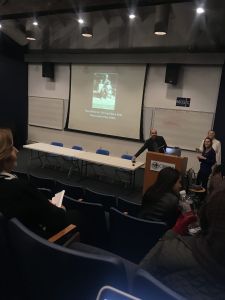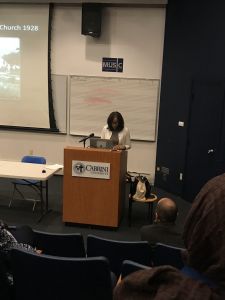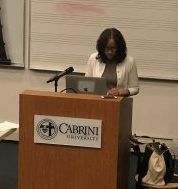Innocent people should not be taken from their homes, taken to a foreign country and forced to work for little to no money was talked about by Dr. Sylviane A. Diouf on Thursday, Nov. 13, to a group of students and faculty. She based her presentation on the book she wrote “Dreams of Africa in Alabama.”
Dr. Diouf is a scholar at Brown University where she took the time to discover how far back slavery began. Many people think the starting point of slavery is the civil rights movement. Dr. Diouf objected to this statement which is the main theme in her book.

Many other states such as Alabama, Mississippi, Louisiana, Florida, which she referred to as “the deep south,” are where the African slaves were brought to. They were brought in a large group and created a family-type connection as they all traveled together. They referred to themselves as “sheep mates.”
These slaves vary from those of the civil rights movement because they did not want to be here, they were brought against their own will. The slaves then had to make somewhat of life for themselves where they were brought to and later were able to obtain land and make a small town for themselves. The slaves wanted to return home but never did so.
Dr. Diouf had to uncover all this information that went into her book by obtaining legal documentation as well as the national archives. The one thing that made her research a little bit easier was that she did not just have to follow one person, but a whole group.
“I was most impressed with the quality of the historical research done by Dr. Diouf. She really was able to provide great details while also remaining focused on the larger societal implications that still exist today regarding the history of the individuals who were captured and brought to America on “the last slave ship” Todd Matthews, coordinator doctoral program, in organization development chair said.

Dr. Diouf took care to honor the people whom she researched by naming them specially and showing rare photographs of them. The photographs furthered helped to vivify and testify to the power of the Yoruba traditions to persist over time, despite the oppression they faced.
“I did appreciate Dr. Diouf’s showing of the rare footage from Zora Neale Hurston’s ethnographic work with Cudjo Lewis,” Dr. Nancy Watterson, associate professor of American studies, said.
Dr. Diouf spent a lot of time to get to know every person that she could find that was in slavery in the deep south in and around the time 1916. She focused on a point that this time in history is not really talked about or put in history books.
She felt as though this time in history is given somewhat of an injustice. Questions were asked by the audience on why this was not focused on and talk about more as to why it was thrown into a corner.
This topic has a heavy impact on American history. There are implications today that still exist in relation to the history of the individuals who were captured and brought to America on “the last slave ship.”
“I think it is critically important for us to more deeply and critically understand history, and not simply to accept the often sanitized versions we see in many texts and historical documentaries. It is also so important to recognize that while this past may seem so distant to Cabrini students (and the rest of us older individuals on campus as well), this history is highly relevant and still impactful in a myriad of profound ways, up to this day,” Todd Matthews said.



